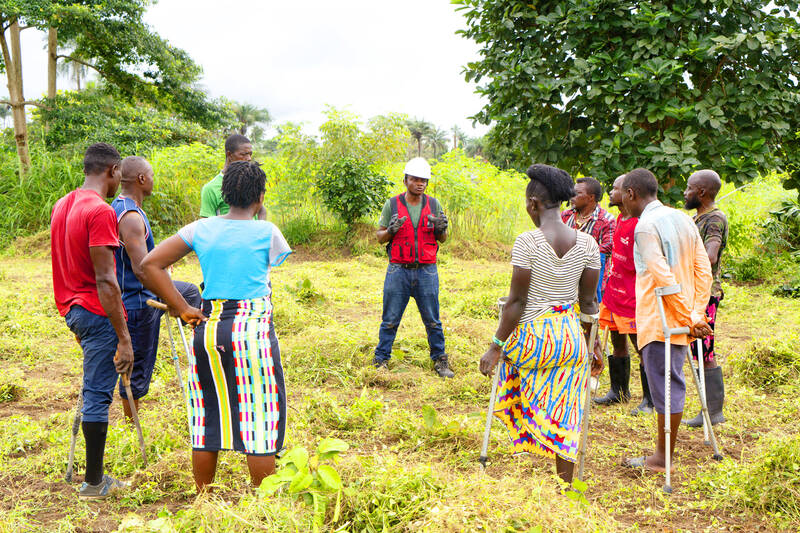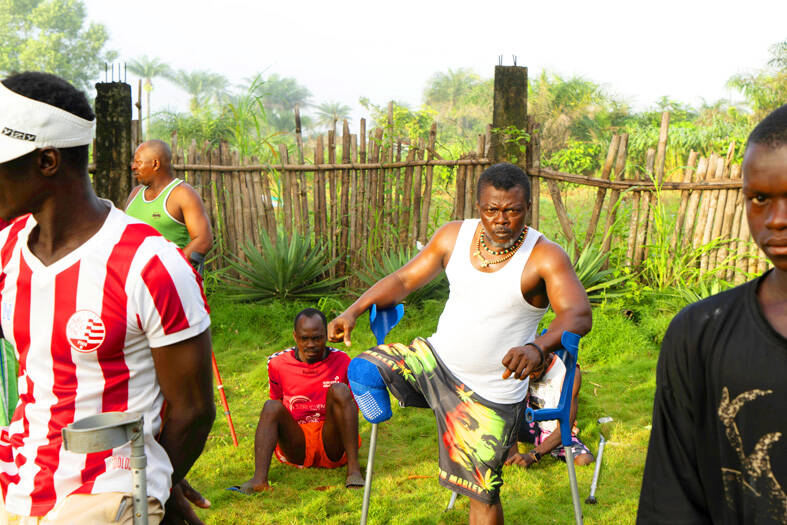Lahai Makieu struck the bamboo with a machete until it cracked and fell. Balancing on his crutch, he reached to pick it up. However, colleagues pulled the bamboo’s other end, and he tumbled into the dense grass.
“They forgot I had one leg,” the 45-year-old said, laughing.
The trainer at a center for amputee farmers picked himself up and added: “We fall and we rise.”

Photo: AP
The phrase encapsulates his journey since the civil war in Sierra Leone. From 1991 to 2002, conflict in the West African country created about 28,000 amputees like him. Amputation by machete was one terror tactic by rebels.
However, even now, amputation rates remain high in Sierra Leone due to motorbike accidents, poor medical care and delayed treatment by traditional healers, medical researchers say.
The government does not collect data on amputees, but the UN estimates there are about 500,000 disabled people in the country.

Photo: AP
Makieu’s left leg was amputated as a child after rebels shot him, and he received no medical attention for a week.
More than 20 years later, in a nation ranked near the bottom of the UN development index, amputees still face discrimination, often regarded as a shameful reminder of the civil war. Many resort to begging and live in the streets.
“No one cares about you as an amputee in Sierra Leone,” Makieu said.
The Farming on Crutches initiative where Makieu works near the capital, Freetown, offers a rare refuge. It aims to restore amputees’ confidence and independence by teaching them skills to start a farm business. They have trained 100 amputees and want to expand their work.
The training has transformed Makieu’s life. After his amputation in 2002, he lived in a small room with a friend in Freetown, dependent on him for food, money and shelter.
At a displacement camp for 270 amputees in Freetown, he met Mambud Samai, the founder of Farming on Crutches and a pastor.
“Many [amputees] are being rejected by their families and communities. They don’t believe they have love,” the 51-year-old Samai said.
He felt moved to help after being a refugee himself in Guinea during the civil war.
First, Samai organized beach soccer matches for amputees in Freetown, boosting their confidence. During a visit to Sierra Leone, former UN secretary-general Ban Ki-moon saw the project and funded a site for an amputee soccer club outside the capital.
However, Samai decided soccer was not enough. As a farmer, he saw agriculture as a path to self-sufficiency. In 2020, he set up a demonstration farm to teach amputees how to farm and become rural leaders.
His project’s name reflects amputees’ widespread use of crutches instead of prosthetic legs in Sierra Leone. Foreign donors distributed them after the civil war, but many people say they do not fit well and cause sores. The country’s only prosthetic clinic is too expensive for many.
Makieu was one of the first Farming on Crutches trainees in 2022. He learned how to use farm waste for organic fertilizer and bamboo sticks for fences. He set up a small farm operation this year with his wife, Zanib, also an amputee. They met during the training and now have a child.
Makieu wants to inspire future farmers.
“It’s my dream to teach people about life. It’s about changing your mindset,” he said.
Morning mist rolled over the nearby mountains as the camp rose for exercises ahead of a strenuous day. They gathered in a circle, harmonizing on local songs before Samai spoke.
“We are created for fellowship, not isolation,” he said. “When we return, we are not as we came. We go home to serve our community as rural leaders.”
“I sustain my life through farming, I met my wife here. This training can be a big package for you,” Makieu said.
However, the vast majority of amputees in Sierra Leone have no such support.
Alimany Kani, 30, lives in a camp built by the Norwegian Refugee Council for amputees on the outskirts of Freetown. He lost his leg when he was a baby, to the same bullet that killed his father in the civil war. Despite holding a graduate degree in social work, he cannot find a job.
“Even if you have qualifications, an able-bodied with less education will always get the job,” Kani said.
The Sierra Leonean National Commission for Persons with Disability said that discrimination toward amputees has improved in the last decade since the Disability Act in 2011 aimed to provide equal opportunities and punish discrimination.
Kani firmly disagreed and called on the government to deliver reparations to victims of the civil war. The Sierra Leonean Truth and Reconciliation Commission in 2009 recommended that amputees receive pensions, access to healthcare, accommodation and education.
However, many of those pledges remain unfulfilled, including for Kani. Only 1,300 out of 32,000 have received a full reparations package due to lack of resources, according to the UN’s International Organization for Migration.
“The government don’t keep their promises. It’s inhumane,” Kani said.
There is no specific support for amputees from the government, the National Commission for Persons with Disability said.
Sierra Leone’s health ministry, the president’s office and the National Commission for Social Action office that manages the reparations program did not respond to questions.
A farming charity in Britain, Pasture for Life, is financing Farming on Crutches in full, but Samai said they need support from the Sierra Leonean government to expand.
Meanwhile, the government is investing more than US$600 million in agriculture, but some believe this would largely benefit large-scale agriculture over small-scale farmers — such as Farming on Crutches trainees — who form 70 percent of the population.
Two such smallholders are cousins and Farming on Crutches trainees, Amara and Moustapha Jalloh, aged 19 and 21 respectively, in central Sierra Leone.
Both recently harvested rice and cassava. Moustapha, who was born without a leg, said his harvest surplus allowed him to pay for computer science training.
He dreams of being an agricultural engineer.
“Any successful story, there must be painful experiences,” he said.

Anna Bhobho, a 31-year-old housewife from rural Zimbabwe, was once a silent observer in her home, excluded from financial and family decisionmaking in the deeply patriarchal society. Today, she is a driver of change in her village, thanks to an electric tricycle she owns. In many parts of rural sub-Saharan Africa, women have long been excluded from mainstream economic activities such as operating public transportation. However, three-wheelers powered by green energy are reversing that trend, offering financial opportunities and a newfound sense of importance. “My husband now looks up to me to take care of a large chunk of expenses,

SECTOR LEADER: TSMC can increase capacity by as much as 20 percent or more in the advanced node part of the foundry market by 2030, an analyst said Taiwan Semiconductor Manufacturing Co (TSMC, 台積電) is expected to lead its peers in the advanced 2-nanometer process technology, despite competition from Samsung Electronics Co and Intel Corp, TrendForce Corp analyst Joanne Chiao (喬安) said. TSMC’s sophisticated products and its large production scale are expected to allow the company to continue dominating the global 2-nanometer process market this year, Chiao said. The world’s largest contract chipmaker is scheduled to begin mass production of chips made on the 2-nanometer process in its Hsinchu fab in the second half of this year. It would also hold a ceremony on Monday next week to

TECH CLUSTER: The US company’s new office is in the Shalun Smart Green Energy Science City, a new AI industry base and cybersecurity hub in southern Taiwan US chip designer Advanced Micro Devices Inc (AMD) yesterday launched an office in Tainan’s Gueiren District (歸仁), marking a significant milestone in the development of southern Taiwan’s artificial intelligence (AI) industry, the Tainan City Government said in a statement. AMD Taiwan general manager Vincent Chern (陳民皓) presided over the opening ceremony for the company’s new office at the Shalun Smart Green Energy Science City (沙崙智慧綠能科學城), a new AI industry base and cybersecurity hub in southern Taiwan. Facilities in the new office include an information processing center, and a research and development (R&D) center, the Tainan Economic Development Bureau said. The Ministry

ADVERSARIES: The new list includes 11 entities in China and one in Taiwan, which is a local branch of Chinese cloud computing firm Inspur Group The US added dozens of entities to a trade blacklist on Tuesday, the US Department of Commerce said, in part to disrupt Beijing’s artificial intelligence (AI) and advanced computing capabilities. The action affects 80 entities from countries including China, the United Arab Emirates and Iran, with the commerce department citing their “activities contrary to US national security and foreign policy.” Those added to the “entity list” are restricted from obtaining US items and technologies without government authorization. “We will not allow adversaries to exploit American technology to bolster their own militaries and threaten American lives,” US Secretary of Commerce Howard Lutnick said. The entities